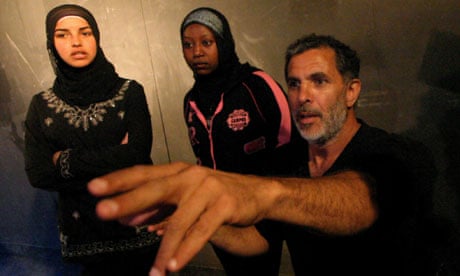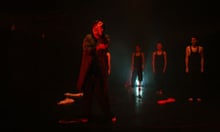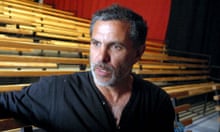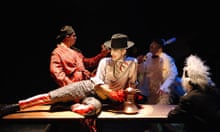He wanted to create an "art revolution" to help liberate the Palestinian people, but he only managed to alienate those he most wanted to inspire.
The murder earlier this month of Juliano Mer-Khamis was condemned all over the world but met with a grim silence by the residents of the Jenin refugee camp where he founded his Freedom Theatre. It has emerged that the residents of the camp had serious grievances against the actor-director that may have provided the excuses for an unknown gunman to kill him.
The 52-year-old, born of a Jewish mother and Palestinian father, attracted funding from the UN, Sweden and the UK for his theatre school and productions but many camp residents found his activities offensive.
His death and attitudes to the theatre highlight the conflict of interest between western donors, local elites and the populations they aim to aid; between liberal western values of freedom of expression and a more conservative, traditional world view.
A fatwa-style leaflet circulated in Jenin this week and seen by the Guardian, lists criticisms of Mer-Khamis and suggests that the final impetus for the murder was his plan to stage a controversial German play that explores teenage sexuality.
Mer-Khamis's mother, Arna, started a drama workshop in Jenin to help children traumatised by the first intifada which began in 1987. In 2002, Mer-Khamis returned to Jenin after the Israeli army's destruction of a large part of the refugee camp and the theatre his mother founded. He discovered that many of the children his mother had worked with had become gunmen and suicide bombers which he documented in his award-winning film, Arna's Children.
But he decided that he wanted to continue his mother's work and create a platform for Palestinian youth to stand up to authority through creativity rather than violence. The Freedom Theatre taught theatre and acting to students, including former gunmen, and staged plays such as Animal Farm and Alice in Wonderland which satirised Palestinian and Israeli authorities.
But while Mer-Khamis entertained thousands and inspired devotion among his disciples, his methods disturbed conservative groups in the refugee camp. The theatre was firebombed twice and Mer-Khamis often envisaged his death at the hands of "a crazy Palestinian gunman".
A community leader said that Mer-Khamis was respected in the camp for highlighting damage inflicted by the Israeli army but his creation of a politically and social liberal theatre was more controversial.
Adnan al-Hindi, the chairman of the refugee camp's "popular committee" said that Mer-Khamis had very different values and ideas from the residents, which caused disagreements.
The nature of the disputes varied. Local leaders were offended when David Milliband, the British foreign secretary, visited the theatre in 2009 without co-ordination with Palestinian officials. They were also offended by groups of theatre visitors touring the camp and by comments made by Mer-Khamis in interviews.
"He said that his message was to liberate citizens from the authority of their leaders and children from their parents. Then there was mixing of sexes and dancing. We tried to discuss it with him and persuade him that he was mistaken but to no avail. Public opinion turned against him," said Hindi.
Inside the camp, rebuilt since its partial destruction in 2002, people were reluctant to speak about Mer-Khamis. A group of elderly women sitting by the roadside, gave their opinion: "God only knows what happened but the theatre was a shameful place."
A butcher was more forthcoming. Standing in a small room with a portrait of Saddam Hussein and a sparsely stocked cold cabinet, he said he and others were offended by the theatre. "We are Muslims. We have traditions. We looked for our children and found them at the theatre dancing. If he came here to bring jobs that would be good but instead he comes here to corrupt our girls and make women of our boys," he said.
The leaflet justifying the killing of Mer-Khamis also demands the closure of the theatre and other western organisations, including the British Kenyon Institute, under threat of "jihadi action".
The leaflet attacks Mer-Khamis for his belief in co-existence between Israelis and Palestinians, "as if we could live with those who stole our land and killed our children".
It goes on to attack his plays: "What kind of resistance [to occupation] is the play Animal Farm, which made the young men of Palestine bark like dogs and lick the ground in shame and the young women wear the costumes of pigs and roll around the ground in degeneracy?"
The leaflet describes Mer-Khamis as a Jew, a communist and an infidel. "He was not killed for a scene in a play. He was killed for the accumulation of his activities since he came here," it says.
Mer-Khamis's most recent project, Spring Awakening, is singled out for particular criticism. The play by Frank Wedekind was banned in Germany in 1891 for its portrayal of teenage sexuality. In recent years a musical adaptation won awards in London and New York.
The leaflet then refers to a telephone conversation between Mer-Khamis and the Arab-Israeli actor, Makram Khouri, in which Khouri advises his friend not to stage the play. According to theatre staff, very few people were aware of the conversation.
The leaflet then praises the man from Jenin refugee camp who carried out the killing. "He did not do it with a silencer, or in the dark but in broad daylight, face to face, and he made sure not to harm the woman and child who were in the car at the time," the leaflet says.
Palestinian police say that their investigation into the murder continues.
Meanwhile, at the theatre staff remain determined to continue the work of Mer-Khamis despite a sense of paranoia that the killer had a connection to the theatre.
Rawand Arkavi, the theatre co-ordinator who is from Jenin, said: "We were cautious before but now we don't care if they shoot all of us. We will keep the theatre going."




